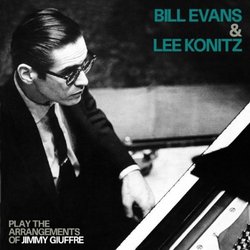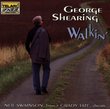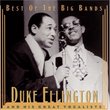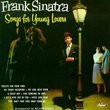| All Artists: Bill Evans & Lee Konitz Title: Play the Arrangements of Jimmy Giuffre Members Wishing: 2 Total Copies: 0 Label: Lonehill Jazz Spain Release Date: 5/16/2005 Album Type: Import, Original recording remastered Genres: Jazz, Pop Style: Cool Jazz Number of Discs: 1 SwapaCD Credits: 1 UPCs: 8436019581933, 758661410729 |
Search - Bill Evans & Lee Konitz :: Play the Arrangements of Jimmy Giuffre
 | Bill Evans & Lee Konitz Play the Arrangements of Jimmy Giuffre Genres: Jazz, Pop
Two outstanding 1959 studio New York sessions featuring Bill Evans and Lee Konitz in octet and nonet settings with an all star horn section and the incomparable arrangements of Jimmy Giuffre. Contains complete LP's 'You An... more » |
Larger Image |
CD DetailsSynopsis
Album Description Two outstanding 1959 studio New York sessions featuring Bill Evans and Lee Konitz in octet and nonet settings with an all star horn section and the incomparable arrangements of Jimmy Giuffre. Contains complete LP's 'You And Lee' & 'Lee Konitz Meets Jimmy Giuffre' and also includes booklet with comprehensive liner notes. Lone Hill Jazz. 2005. Similarly Requested CDs
|
CD ReviewsBrilliant arrangements, brilliant soloists, brilliant album! A. Lee | Boston, MA | 11/21/2008 (5 out of 5 stars) "I found myself in an actual record store (these seem to be dying out these days), and stumbled upon this album in my hunt for Jimmy Giuffre CD's. First, I could not turn down the all-star cast.. Bill Evans, Lee Konitz, Jim Hall, Roy Haynes, Wayne Marsh.. No question about it, this album had to be good. Upon my listening, my ears were dazzled by the sonic textures that seemed so fresh and new: Strange tensions where you normally wouldn't have them, new textures brimming about every stanza, unusual horn harmonies, virtuoso solos by Konitz, Evans, and others. Sheer beauty. My favorite tracks from this album are "The More I See You", "Somp'n Outa Nothin", "Darn That Dream", and "The Song is You", but I love the whole album. I recommend this album for people who want to get a flavor of Giuffre's brilliant arranging style, and also just for anyone wanting to hear some great jazz!" Riddle: What's the difference between jazz and classical? Giordano Bruno | Wherever I am, I am. | 06/18/2010 (4 out of 5 stars) "Answer: one letter "O". (see below)
But apart from riddling, I'd have to say something to the effect that 'classical' music is composed from the side of the brain that deliberates, monitors itself, revises, reasons over 'reasons', while jazz is elicited from the other side of the brain (can I get away with calling it the 'unconscious) by the occasion of performance, drawing from the substrata of musical memories but best when it's freest from self-monitoring. Yea yeah, I know... Balderdash. But since the bebop era, since Parker and Tristano, the question has to be asked. And yet ... don't we all sense that there is still a difference? And that "jazz" is most exciting when it's clearly something other than "classical" sold to a different audience? So "arrangements of jazz" seems to me to be an oxymoron. That's what I hear on this CD. Something neither here nor there. The 'improvisational' choruses by Lee Konitz on alto jazz are upfront jazz, very expressive, fresh, exciting. So are the duets between Konitz and tenor sax Warne Marsh, two of my favorite post-bebop jazzmen. But the arranged intros and ensemble choruses sound "canned" to me. Hokey. Cutesy. Obviously they are "composed" music, notated in 'fake' books, deliberate and written by rule, to be played the same way every time. So why shouldn't they be evaluated by the same standards as "classical" music? I can't find any reason why they shouldn't be expected to match the musical standards of contemporary "classical" composers like Magnus Lindberg, Arvo Part, or Elliot Carter. By that standard, these "arrangements' by Jimmy Giuffre just don't cut much ice. The "wholes" are less than the "parts" in musical interest. My four-star rating is only for the parts that are authentically jazz to my ears. The piano of Bill Evans on this CD hardly deserves mention. Evans can be great, but in this context he sounds perversely extraneous and contrary. [Answer to riddle: Classical used to be played in salons; jazz used to be played in saloons.]" |

 Track Listings (17) - Disc #1
Track Listings (17) - Disc #1

